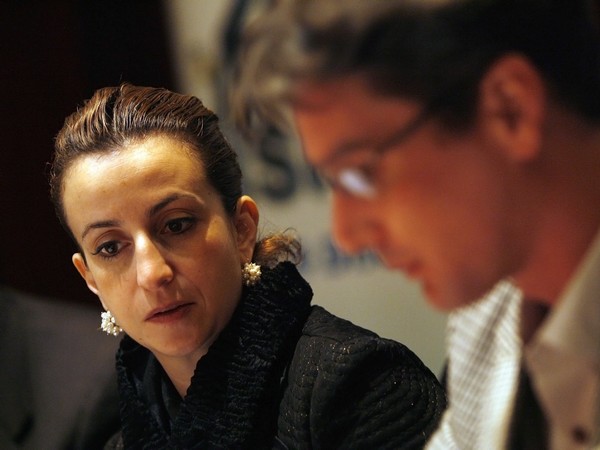Women and peace: Congratulating Ghaida Rinawi Zoabi

The monthly economic magazine ‘The Marker’ has chosen Ghaida Rinawi Zoabi, a peacebuilder with Interpeace local partner in Israel, ‘Injaz’, as one of the 100 most influential Israelis. The magazine chose Ghaida based on her positive influence in the Arab municipal sector and her emergence as a prominent figure within Israel’s substantial Arab population.
Ghaida’s rise to prominence has broken the mold. She is 39, married and a mother of two. She received a B.A. in Psychology from the Hebrew University and a M.A. in Organizational Consulting from the University of Haifa. She is the coordinator of Interpeace’s work among the Palestinian Arab Citizens of Israel which is one of three projects that the Interpeace is initiating in Israel through the Base for Discussion (B4D).
Ghaida has had a positive impact on lives across Israeli society.
Ghaida, joined the team in 2005, at the time when the B4D started to work among the Palestinian Arab Citizens of Israel. Her work has demonstrated her tireless effort to establish dialogue and craft peace. Her many initiatives with various organizations have made a major difference in the lives of countless members of Israeli society. She is a worthy recipient of her recognition as one of the 100 most influential Israelis. Interpeace’s Director General Scott M. Weber congratulated Ghaida on her achievements. “Your recognition as one of the 100 most influence Israelis is well-deserved. All of us at Interpeace are proud of your accomplishments and your work continues to help lay the foundations for lasting peace in the region.” he said.
A focus on dialogue
In 2008 Ghaida established Injaz, the Center for professional Arab Local Governance in Israel. Through this organization she seeks to foster change and initiate dialogue between the Israeli government and the local Arab populations. The vision of Injaz is “to provide the best opportunities for social and economic development and a sense of belonging, giving the individual and the collective a feeling of stability and growth.”Significant progress has been made due to Ghaida’s inclusivity in the negotiating process.
Inclusiveness is the bedrock of Ghaida’s philosophy
“I am always looking to reach out to marginalized groups, so the idea of excluding anyone is painful. Dialogue with opinion leaders and policy makers is also important,” explains Ghaida. “Inclusiveness is the bedrock of my approach to peace and something I strive to achieve at every turn.”
This unique approach has allowed her to bridge gaps not just among the varying factions in the Palestinian Arab community but between the Jewish and Arab communities within Israel as well.
An example of her ability to bridge gaps and to facilitate the development of a common position that unifies the different groups within the Arab citizens of Israel has been the publication of the ‘Future Vision’ document. This document was first published in a press conference in December 2006, with a long-term (20 year) horizon. It also includes seven position papers representing common principles and goals on the following topics:
- The relationship with the state and Jewish society;
- Formal and non-governmental organizational work;
- Economic and developmental growth;
- Land and housing;
- Cultural and social structure;
- Education;
- Legal status of the Palestinian community in Israel; and
- A joint ‘Plan of Action’ for pro-active engagement with the statetate, including in the ongoing debate around a constitution.
A broad involvement
In addition to her work with Interpeace and Injaz, Ghaida is an active participant in a variety of organizations, ranging from the International Women’s Commission, which seeks an inclusion of women in government, to UNIFEM, a U.N. organization dedicated to gender equality, to the Arab Center for Law and Policy, which seeks socio-economic equality for all members of Israeli society.
